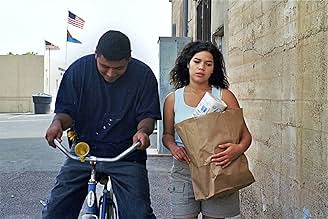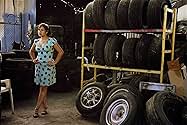Cómo pasaron su verano las mujeres García
Título original: How the Garcia Girls Spent Their Summer
CALIFICACIÓN DE IMDb
6.1/10
680
TU CALIFICACIÓN
Agrega una trama en tu idiomaThree generations of women in a Mexican American family experience sexual awakenings over the course of a summer.Three generations of women in a Mexican American family experience sexual awakenings over the course of a summer.Three generations of women in a Mexican American family experience sexual awakenings over the course of a summer.
- Dirección
- Guionista
- Elenco
- Premios
- 5 premios ganados y 2 nominaciones en total
Roman Arabia
- Oswaldo
- (as Victor Wolf)
- Dirección
- Guionista
- Todo el elenco y el equipo
- Producción, taquilla y más en IMDbPro
Opiniones destacadas
I normally don't write reviews but after reading some of the negative things about HOW THE GARCIA GIRLS SPENT THEIR SUMMER I felt inclined to say something. I've seen this film twice now. Once at Sundance and then more recently at the Latino Internation Film Festival. Both times I can't help but get caught up in the sheer scope of the film. Normally scope is applied to a movie that covers a ton of different locations and makes the audience think that they've wandered the globe. That's not what this scope is. The scope here (and maybe that's the wrong word) is that the audience feels like we're part of this small town. We feel it's inner workings, we feel what life is like there, like we live there (not unlike what LONESTAR felt like.) It's fully imagined and is a total compliment to Riedel's strength as a director. Yes, the film isn't conventional as in it doesn't lay out everything in a tight, conventional structure...but I don't think that it's meant to. I think it was meant to again, let the audience get a taste of this small town, let us see what it feels like so when the characters in this film start to experience love, we feel how much it means to them because we live there too. Because it's the little things in life that make us happy, change us...and that's what this film is about and does so well. It shows us all this, but in a realistic way. In a way that US audiences aren't used to being shown. It's a strong vision with good writing, good acting, and a lot of heart. That's not say that it's an art movie either that's going to bore you. Because it doesn't. What it does is transport you to a definite time and place and does so in an entertaining way. Seriously. The humour here is great and again, dealt with in a realistic way, so that when things happen, we can relate. At least I could. And so could the two audiences I saw it with. People complain about not having any real movies, movies that aren't cookie cutter, and that are different. This is all of the above and something that I think most people would enjoy if they just give it a shot.
10pribelle
This is a wonderful film! I just saw it last night at the Riverrun Film Festival in Winston-Salem, NC last night with a packed house that was was beyond satisfied! Aside from the wonderful performances (especially Elizabeth Pena), the writing is insightful, especially knowing how young the filmmaker is. It is funny, touching, and REAL. The non-verbal scenes are especially strong and show a side of women we rarely see. We need more films like this that at fully explore the dynamics of being a woman is today's society. The characters are realistic and the story is compelling. The "Greek Chorus" of older Latino men that are seen throughout the film could be a film unto themselves. Most importantly, this film exposes us to a culture we don't know enough about. Most men won't appreciate this film, (a lot of the references will fly over their heads) but the First Wives Club audience will flock to it, as will senior citizens groups who will sing it's praises! If you enjoyed Real Women Have Curves you will LOVE this one! (same lead actress too!) This is a "chick flick" film with whole lot of heart.
First off, after speaking to the director at the night of the Latin Film Festival here in New York, I would like to again commend her for a job well done. I am also a first time director so I definitely correlated to a lot of the jerky camera movements and experimental camera shots that were probably theorized but never executed to their fullest extent. There were also some doubtful moments with audio at times; however, having discussed these decisions with her personally I came to an understanding as to why they were done. This of course does not take away from the obvious, the film did drag, and it definitely needs some severe editing adjustments. The three raunchy sex scenes were left on screen for a reason, not only to try something new, but to give the audience a feel for a real life situation that women face in an every day environment. The scenes can be shortened however and still give the audience the same feel. The length they are at now makes the scenes disturbing and deteriorates from the comedic undertone that was originally intended by the director. There are many other comedic ploys executed that trick the audience into thinking something evident is about to happen, when it really doesn't. These techniques keep the audience in a(n) intriguing suspense, but you can only have our attention for so long.
The Garcia girls consist of women from three successive generations: Dona Genoveva (Lucy Gallardo), the septuagenarian matriarch of the clan; Lolita (Elizabeth Pena), her stressed-out single-mother daughter; and Blanca (America Ferrera), her just-beginning-to-learn-about-life teenaged granddaughter. As the middle person in the hierarchy, Lolita has her hands full dealing with not only her own issues of a middle-aged divorcée struggling to make something of her own life, but those of an aging mother who's suddenly decided she wants to learn how to drive and to become romantically involved with the family gardener, and of a daughter who's just beginning to learn about boys and the strange impulses and yearnings that are suddenly pouring forth from her rapidly changing body.
At its core, "How the Garcia Girls Spent Their Summer" shows how the problems of sex, love and relationships cut across all generational lines. Genoveva, for instance, is every bit as interested in achieving physical intimacy with a man as is her virginal teenaged granddaughter. In fact, this is one of the rare films that even acknowledges, let alone dramatizes, the fact that older people can be every bit as sexually preoccupied and sexually active as their much younger counterparts. And the movie also notes that the social and religious taboos placed on senior citizens having sex are every bit as intense as those placed on youngsters for the same thing. And caught in the middle of all this is Lolita, who often doesn't know quite what to make of either her mother or her daughter - or how to find the right balance between her own desires and needs and the responsibilities of being a breadwinner, a supportive daughter and a guiding force in her child's life.
As written and directed by Georgina Riedel, "How the Garcia Girls Spent Their Summer," which is set in a small dusty town in the Desert Southwest, focuses so intensely on the minutiae of the everyday lives of these women that it's bound to leave some in the audience feeling restive and impatient throughout large stretches of the film. The movie is filled with languid scenes where not a whole lot seems to be happening, and the pacing is often more desultory than it needs to be, which doesn't make the time go any faster. Yet, in a way, the style effectively picks up the rhythm of life in a sleepy town, where the wealth of experience seems frustratingly curtailed and the future itself sadly limited. In fact, Riedel periodically cuts away from the "action" to focus on a group of elderly gentlemen who sit around all day discussing what they've learned over the years about cars and girls, in roughly similar terms - which explains a great deal about just what these women have to deal with on a daily basis just trying to come to terms with their own roles in a largely male-dominated world. And beyond the uncompromisingly truthful and understated performances by the three leading ladies, the director demonstrates a keen eye for composition that makes the film at least visually interesting even when the drama itself isn't always engaging us completely.
Thus, for all its flaws, "How the Garcia Girls Spent Their Summer" provides many compelling insights into what it means to be a woman - in particular an Hispanic woman - in the modern world.
At its core, "How the Garcia Girls Spent Their Summer" shows how the problems of sex, love and relationships cut across all generational lines. Genoveva, for instance, is every bit as interested in achieving physical intimacy with a man as is her virginal teenaged granddaughter. In fact, this is one of the rare films that even acknowledges, let alone dramatizes, the fact that older people can be every bit as sexually preoccupied and sexually active as their much younger counterparts. And the movie also notes that the social and religious taboos placed on senior citizens having sex are every bit as intense as those placed on youngsters for the same thing. And caught in the middle of all this is Lolita, who often doesn't know quite what to make of either her mother or her daughter - or how to find the right balance between her own desires and needs and the responsibilities of being a breadwinner, a supportive daughter and a guiding force in her child's life.
As written and directed by Georgina Riedel, "How the Garcia Girls Spent Their Summer," which is set in a small dusty town in the Desert Southwest, focuses so intensely on the minutiae of the everyday lives of these women that it's bound to leave some in the audience feeling restive and impatient throughout large stretches of the film. The movie is filled with languid scenes where not a whole lot seems to be happening, and the pacing is often more desultory than it needs to be, which doesn't make the time go any faster. Yet, in a way, the style effectively picks up the rhythm of life in a sleepy town, where the wealth of experience seems frustratingly curtailed and the future itself sadly limited. In fact, Riedel periodically cuts away from the "action" to focus on a group of elderly gentlemen who sit around all day discussing what they've learned over the years about cars and girls, in roughly similar terms - which explains a great deal about just what these women have to deal with on a daily basis just trying to come to terms with their own roles in a largely male-dominated world. And beyond the uncompromisingly truthful and understated performances by the three leading ladies, the director demonstrates a keen eye for composition that makes the film at least visually interesting even when the drama itself isn't always engaging us completely.
Thus, for all its flaws, "How the Garcia Girls Spent Their Summer" provides many compelling insights into what it means to be a woman - in particular an Hispanic woman - in the modern world.
An amazingly intriguing piece of 3 different generations of Mexican/ American women in small town America driven by their search for love and honesty. The young director shows in depth the oddity and boredom that come with the life given to her 3 amazingly performed lead characters. The most wonderful casting of real people faces lets you be in their world and experience their love/pain, while underlining this with beautiful artistic images that seem like modern paintings at times. The choice of 35mm anamorphic also emphasizes the emptiness and overwhelmingly loneliness felt for this desert town. The 3 beautiful, funny and different story lines leave you with loaded emotional questions about love and following your heard. This is a must see independent movie!
¿Sabías que…?
- TriviaFinal film of Lucy Gallardo.
Selecciones populares
Inicia sesión para calificar y agrega a la lista de videos para obtener recomendaciones personalizadas
- How long is How the Garcia Girls Spent Their Summer?Con tecnología de Alexa
Detalles
- Fecha de lanzamiento
- País de origen
- Sitio oficial
- Idiomas
- También se conoce como
- Secretos de verano
- Locaciones de filmación
- Productoras
- Ver más créditos de la compañía en IMDbPro
Taquilla
- Total en EE. UU. y Canadá
- USD 215,303
- Fin de semana de estreno en EE. UU. y Canadá
- USD 91,432
- 18 may 2008
- Total a nivel mundial
- USD 215,303
- Tiempo de ejecución
- 2h 8min(128 min)
- Color
- Mezcla de sonido
- Relación de aspecto
- 2.35 : 1
Contribuir a esta página
Sugiere una edición o agrega el contenido que falta































